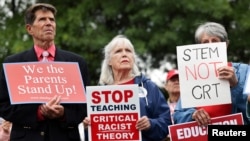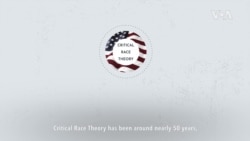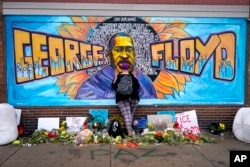The teaching of America’s racial history is dividing voters as state governments and federal judges weigh in on what is known as critical race theory.
“What we are seeing is that America is having a very public argument about how to discuss race in our country,” explained Stanford law professor Ralph Richard Banks. “It is a conversation about how we talk about the racist incidents in our past but also about how the past continues to shape inequalities in the present.
“But what makes the topic especially charged,” he added, “is that this is a debate that has reached our children and their classrooms.”
Banks says part of the issue is disagreement over an approach to the subject known as critical race theory.
Liberals largely see it as a way of understanding how American racism has shaped public policy, while conservatives view it as a divisive discourse aimed at shaming white Americans for past atrocities while further dividing the country’s racial groups.
“I have no problem with the teaching of history,” explained Cody Clark, a Republican voter from Denton, Texas. “But I don’t like the idea of teachers telling our children that some of them are privileged and some of them are oppressed. I think that just passes our divisions to the next generation.”
Louisiana Republican Governor Jeff Landry this year signed an executive order banning the teaching of critical race theory in public schools, making the Pelican State the 18th in the country to limit or ban the subject.
Public school teachers and civil rights attorneys are responding. Civil rights attorneys in Little Rock are arguing before a federal judge that an Arkansas law banning critical race theory in schools violates the U.S. Constitution.
Louisiana public school teacher Lauren Jewett calls the bans misguided.
“I think it’s laughable and insulting in the same breath,” she told VOA. “K-12 teachers don’t teach critical race theory. It’s not in the state standards or our curricula and, to be honest, we don’t even have enough time to eat our lunches or meet all our students’ needs, let alone create new material.”
What is critical race theory?
While Jewett says laws banning critical race theory in public schools are political stunts, she also calls accurate accounts of American history essential.
“Our country has many uncomfortable and violent truths such as slavery, colonization, segregation, and mass incarceration,” she said. “It is important for our students to understand why things in the current day are the way they are and how history informs that. But that is not critical race theory.”
To understand what critical race theory is, Stanford Law professor Banks says you need to go back to the U.S. Supreme Court’s landmark 1954 decision in Brown v. Board of Education.
“The decision said that racial segregation of our public schools was unconstitutional,” he told VOA, “but more than a decade later, civil rights leaders noticed nothing had changed. Black students were still going to different schools of a lower quality than their white peers.”
Banks says critical race theory was developed to help understand why — even when Americans passed laws to create equality — inequality seemed to prevail.
Civil rights lawyers including Derrick Bell, whose thought was vital to the development of critical race theory, concluded that racial bias is inherent in Western society’s legal and social institutions, as the race with the most political power had material reasons to protect that power at the expense of other races.
Well-developed among legal scholars in the 1970s, the theory was largely unknown to the public.
“Critical race theory was so obscure it wasn’t even something taught at most law schools,” Banks says. “It wasn’t in practice in corporate law or even civil rights law, but more like a framework or approach some academics might use to understand race-based issues.
“But that all changed after George Floyd was killed.”
Bogeyman in the mainstream
Banks says critical race theory grew to prominence largely as the target of Republican reaction to the Black Lives Matter movement that rose from the 2020 death of George Floyd at the hands of a white police officer in Minnesota.
Critical race theory “was a good target because it embodies three things that tend to give many Americans a lot of anxiety,” Banks said. The idea that “being critical of this country isn’t considered part of ‘the American spirit;’ [that] we have strains of anti-intellectuals that make theories repulsive; and we don’t feel comfortable talking about our racist past as if it’s unresolved.”
A 2023 poll by the Black Education Research Center at Columbia University found that 85% of respondents agreed that public school students should learn about the history of racism and slavery in the United States and its impact on events today.
That consensus evaporates when it comes to the government’s role in righting past wrongs.
“Of course, I think students should be learning about how our government has been prejudiced in the past in dealing with minorities through policies like slavery or not allowing mixed marriages,” explained Rebecca Urrutia, a Republican voter in Tolland, Connecticut. “I also think we need to teach about revisiting our laws to change any that are still unfair today.
“But I don’t think it makes sense to be teaching things like critical race theory to our kids,” she added. “If teachers are trying to convince white students that they have an inherent tendency toward privilege and discrimination against Black people, then I think this perpetuates the very cycle they claim they are trying to escape. Instead, teach our true history and our progress so we can learn from our mistakes and successes.”
Some Democratic voters view attacks on critical race theory as part of an effort to discredit movements that would promote the interests of minorities in the United States.
“They’re trying to turn critical race theory into a political bogeyman, and the result is getting closer and closer to censorship,” says California Democrat Evante Daniels.
“These anti-CRT laws are so unclear that schools become unsure what they can and can’t teach. Are LGBTQ clubs and ethnic studies okay? How about culturally relevant teaching? What happens when teachers are afraid to effectively teach about our past because they don’t know if they’re breaking a purposely ambiguous law?”
Banks of Stanford Law has similar fears.
“I actually understand if a parent has a concern about their second grader learning about things like white privilege,” he said. “That’s a valid concern. But if a teacher doesn’t know what is and isn’t allowed, they operate from fear and leave important parts of lessons out. The result, unfortunately for our kids and our country, is an impoverished education.”







